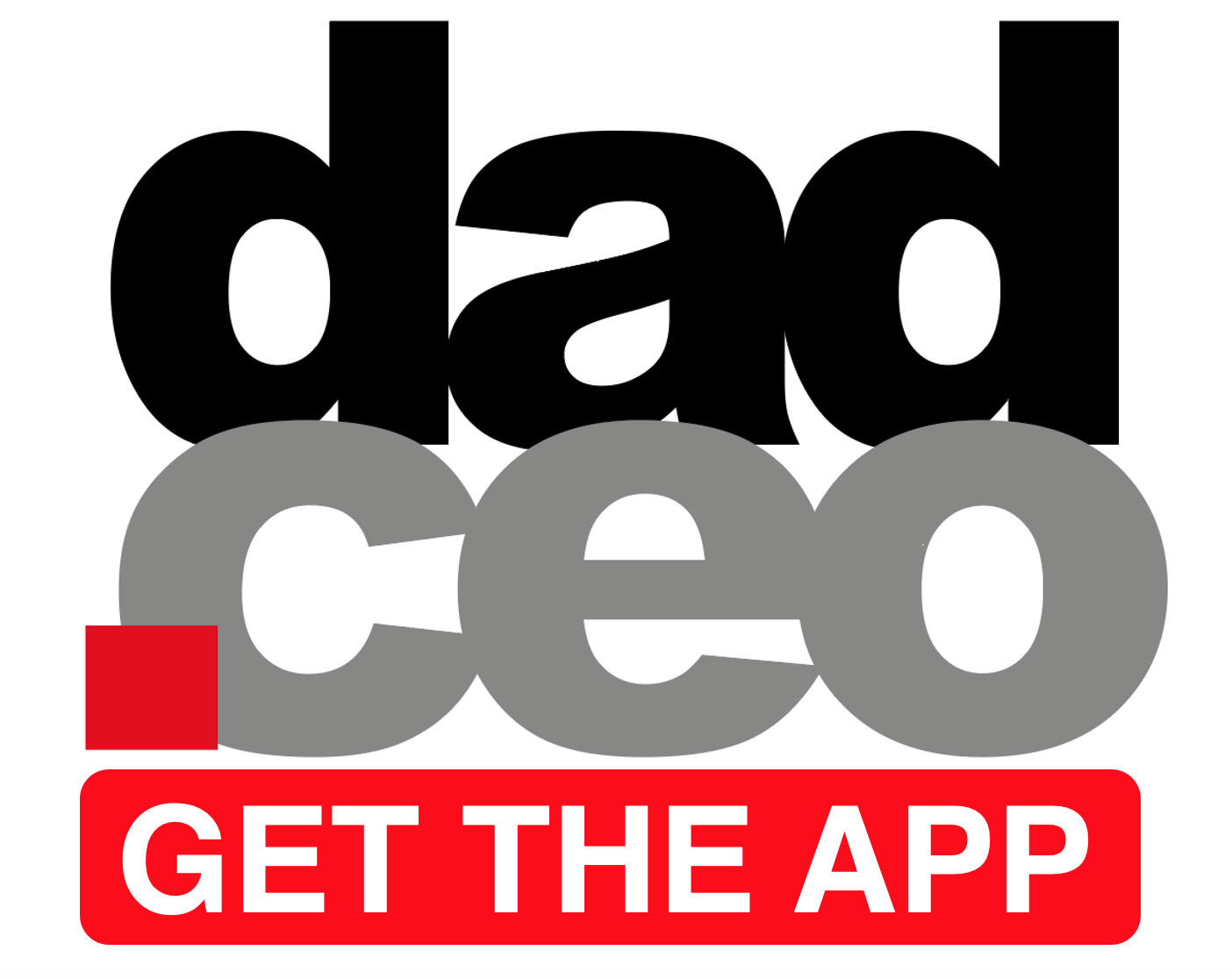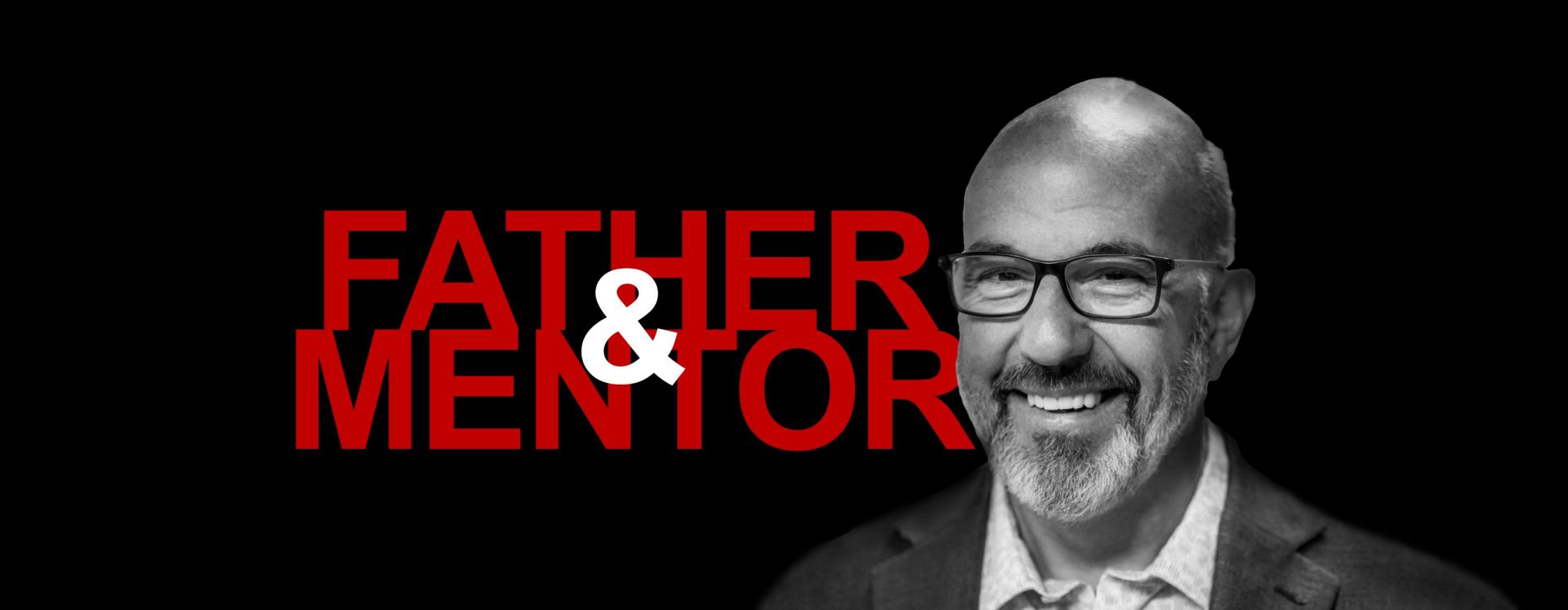Much has been said and reported about Jeff Hoffman's visionary approach with what many call his 'Midas Touch' for all things business such as Priceline.com (booking.com in Europe).
Humanitarian causes are also a great passion for Jeff who selfishly gives his time and money to various causes around the world and most notably to children programs as well as mentoring the next generation of young leaders. But what about Jeff Hoffman the parent, the dad, the father figure?
DAD.CEO was honored that Jeff was willing to sit down with us (virtually of course) to give us his viewpoint, vision, and most importantly what matters most to him on what it means to be a great dad and how we all can better influence and mentor our own children to forming the next generation of global leaders.
Luc Chénier: Jeff, what 3 lessons did your mother, father, or mentor teach you that you feel are still relevant in today’s digitally connected world?
Jeff Hoffman: I’ll do 1 of each – 1 for my mom, 1 for my dad, and 1 for my mentor. The reason is they are extremely relevant long-term lessons.
I had a single mom for most of my life and she very much believed that if you really want something, you have to work for it and when it’s time to get something done,
"GO DO IT!"
There’s no one who can stop you from getting what you want or need if you are willing to do the work yourself. As a child hearing that message from my mother all the time, who was a single mom who sometimes worked up to 3 jobs at the same time to take care of her 4 kids, that was a great message! That was one of the very first lessons that I learned from her that it’s ok to want things, but you need to go out there and work for it. A good example of that was wanting for myself an Ivy League education. I wanted to go to Yale for which we had no money in our family to pay for this. So, I literally started my own business at 18 years old, so I could work hard and make enough money to attend the school I wanted. Instead of quitting because I had no money, my mom’s lesson was
“Just work harder and find a way!”
That advice from my mother about being willing to work for what you want in life was instrumental to me in my life.
Ringing the bell at the New York Stock Exchange
My father who I did not really know until later on in my life, taught me about the importance of relationship management. You should not call on the people in your life all of a sudden when you are in trouble and you need something. You should take care of your relationship throughout your life. So my father’s advice was the reason why I would sometimes call a board member, an investor, or a customer and even a friend and invite them for lunch to where they would ask: “Why or what do you need?”. I would reply that "I don’t need anything, simply I want to spend time with you and see how you are doing and to say hello".
My father thought me the importance of managing relationships all the time. In good times, bad times, and everything in-between. Not just when you need something.
My mentor, whose name was Roger taught me about the clarity of communicating. He told me:
“Jeff, if you can’t explain what you want to say to people, what you need, and what you mean in a sentence, then go back and work on it some more.”
There’s a famous saying by Mark Twain that I absolutely love from a letter that he wrote to a friend of his that turned out to be a really long letter. To conclude his letter, he wrote:
“P.S. I would have written you a much shorter letter if I only had the time.”
I absolutely love that quote because being brief and concise takes hard work. My mentor Roger would constantly say: “Jeff, say that again in half the words.” Then he would ask me to say it again, but with half of those words. Roger taught me that simplicity and clarity are critically important in getting any message you want to get out to the world in order to be properly heard.
Luc Chénier: How would you like to be remembered as a CEO and as a father?
Jeff Hoffman: That's an interesting question that I’ve given quite a bit of thought to it. My best friend unfortunately drowned in a freak accident in the Irish Sea at 42 years old. At his funeral, losing my absolute best friend truly made me think about that a lot. People at his funeral were remembering him for things I am sure he would not want to be remembered for.
I believe for me, the things I would like to be most remembered for would be for people to say that their life was a little bit better because I had been a part of it. I don’t want to be judged by the number of deals I did or dollars I made. I want to be judged by the number of people's lives I somehow contributed to and made better.
I did have an incident when I was working and away from home quite a bit. I was the Chairman for an association of disabled kids, where our mandate was to get them outside playing on a team for sports where they never imagined they could participate. I once took my daughter to one of these events to push these children around in the wheelchairs so they could play outside and play a softball game. In the middle of it all, when all the kids were laughing and having a great time, my daughter turned to me and said:
“Is this why you work so hard?”
I nodded yes and she said:
“Then keep doing it!”
That statement from her absolutely brought me to tears. She told me that if there was anything she could do to help then to just let her know. 
Jeff Hoffman mentoring children in India.
She made the relationship that “Yes, I work harder than I wish I did, and sometimes I’m gone more than other dads might be", but the relationship between hard work and success is an obvious one and success is a platform that enables you to do things like buying wheelchairs for less fortunate kids while running a sports league, etc. When she figured all that out that day, she said: “I get it now and I appreciate what you do!” That was extremely important for me because that’s what I want her to remember me for and not the days that I worked late.
Luc Chénier: The word ‘NO’ is a truly powerful word in business, but does it work equally well at home, or is YES a better answer since the relationship is more personal?
Jeff Hoffman: YES! Nowadays when you are speaking to children and disagreeing, instead of simply saying NO, there is a new style that I wish I had known earlier, where you say YES, AND… instead of YES, BUT… When you say YES, BUT... that means you are really negating everything before the YES. When you say YES, AND… then you are opening a discussion that I feel is more collaborative. Therefore, I tend to focus as a dad more on the YES part where instead of saying “NO! You can’t do that!” I would rather start with “Why don’t you do this instead or Why don’t you consider this, etc.?”
If it would be just a straight NO, then a good way to get to NO is to say: “I want you to consider the impact of that and tell me what you think it is.” That’s not starting with NO, that’s starting with ‘Let’s have a discussion’ which is more of a YES. ‘Yes, we can speak about that and I want you to come to the conclusion that this was a bad idea’. There are times when children hit puberty and any rationality goes out the door, and sometimes you simply have to say a firm “NO! You’re not going out with those kids”.
But, the YES, AND… and the explanation was always more powerful of an option. BTW, that was my mother as well. She was never a screamer, a yeller, or a spanker. Nothing like that! She would rather sit down and talk it over while she would explain to me why the choice, I made was not a good choice. With her, it was always a discussion and never a screaming match. I took that forward as a positive thing in talking to them and helping them understand. When you just say NO and walk away, they did not learn anything about why that was a NO. I have always favored the YES, AND... as a discussion starter
Luc Chénier: I like this! I keep telling myself that I will one day write a book on the power of NO and YES, for work and at home.
Jeff Hoffman: I do have to say that the word NO, is extremely underused in business. NO is an important word, but I just like to get to a conclusion in a more positive and learning way, instead of a simple NO, where the child doesn’t understand what the NO was about and what was wrong about it.
This is a true story. We were at a friend’s house for a BBQ, and someone’s child picked up a potted plant and threw it through a plate-glass window and the owners of the home, naturally became irate with the child’s parents and said: “Aren’t you going to say something to your child?!” The mother of the child calmly replied that “We don’t use the NO in our home. We don’t believe in saying NO is a great way to raise kids.” They were then asked directly to take their YES kid and to leave the house immediately!
"That to me was extreme and simply ridiculous!"
Luc Chénier: CEOs are tasked with setting and implementing business KPI’s, growth, and performance targets. But should they do the same at home with their kids and family?
Jeff Hoffman: My answer is a firm YES! Children with goals design their own lives before they get to a point where they look back and say "I wish I had done different things in high school, college, etc." Therefore, accountability is a really important thing for people to learn. The younger they learn that accountability is a good way to become an amazingly productive contributor to society. So, putting a reminder or task on the fridge is effectively your children's KPI’s, mission statements, etc.
This is really important as it gives them direction and it gives them a goal, even if it’s going to change, you might be headed towards one thing you think you’re interested in life as a child and as you get older you realize that this was not for you after all. I thought I wanted to be a vet until I saw someone cut open a dog and quickly realized that being a vet is not for me anymore! But the fact that you had a goal gave you a North Star as a young person to make choices that took you to places that you wanted to go.
So, I think YES, it is important to teach kids accountability and to let them create some KPI’s of their own so that you may celebrate and reward them for setting a goal and achieving it! Showing them how proud you are of them with the result of achievement has put you one step closer to something you said you wanted to do!
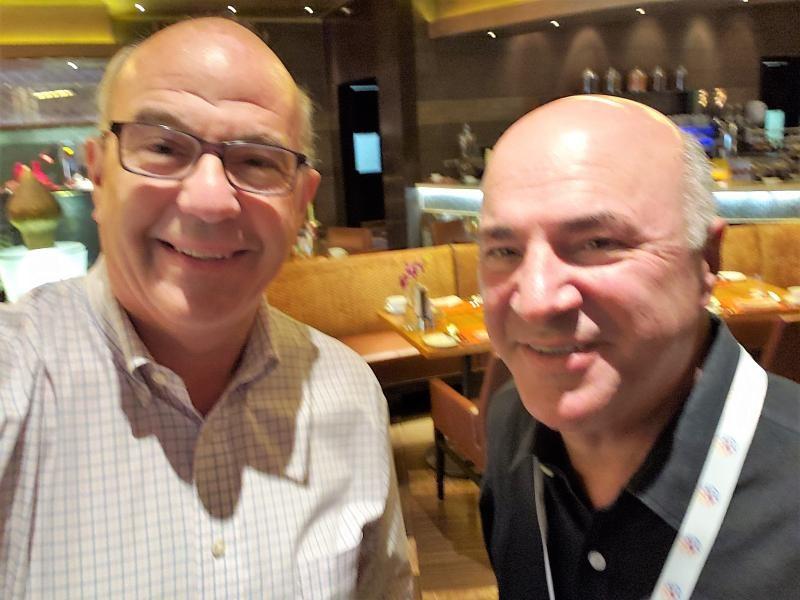
Jeff Hoffman with Kevin O'Leary of Shark Tank fame.
Luc Chénier: But what about the father and his role in the family? Doesn't he need some KPI’s on how he is raising his children and contributing as a dad?
Jeff Hoffman: I think it’s great to sit down and have a family meeting to determine what are everyone’s responsibilities and how should everyone’s performance reviews should be structured like? In fact, I do recall doing exactly that with my daughter in a truly fun way.
As a CEO, I was in the process of doing performance reviews for my team and my daughter had asked me about it. I explained to her the process and the reasoning, etc. This gave me the idea to propose to her for us to make our own family performance reviews. She thought that it would be really fun, so we sat down and started speaking about it on what exactly was our job description? We made sure to make it a fun exercise. Our first question was ‘what is the dad’s role? What is the mom’s role? What is the child’s role?' What does each of us feel like the other person is responsible for and should do? Etc. We made this exercise fun but made it in a way that is was designed in a corporate way where we sat down at the kitchen table that became our board room table and we created our ‘family performance review’. But while we had fun doing it, it was very much real that it opened up the discussion of ‘What do you think that I as a father should be doing that I’m not and what am I doing well?’ What a great question to ask your own kid?
“How am I doing at being your dad?”
And then asking them what they think you should be doing, and how to hold each other accountable and how we should grade each other, etc. All very productive and positive steps to take.
Luc Chénier: You’ve launched some truly large companies and earlier in our interview, you mentioned that you were often away from home for business reasons. Did you develop Work/Life Balance tricks that the rest could benefit from?
Jeff Hoffman: The whole Work/Life Balance is simply a huge myth in my opinion. The reason I say it’s a myth is that people think that the goal is perfection and that will simply never happen. You literally, physically, mentally, emotionally, and spiritually cannot have it all. No single person can do everything right all the time.
The first step in the whole balance issue is to stop holding yourself up against an unachievable standard. What you need to do instead, is do the best that you can do! This means that it’s never quite stable. A good example was that once I was flying in a helicopter and the pilot surprised me and asked me to fly it for a moment and passed me the control where we almost instantly flipped upside down. He then proceeded to bring it back under control and calmly told me that the difference between flying a helicopter versus a fixed-wing airplane is that a helicopter is at all-time trying to spin wildly out of control as opposed to a plane that is floating in the air. You use all 4 limbs, left & right arms, legs, etc. constantly trying to keep everything stable.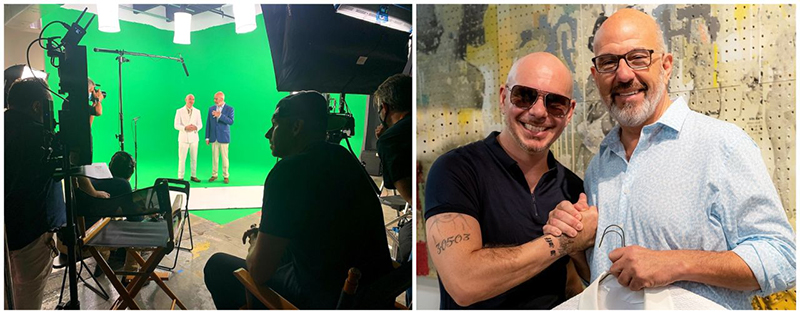
Jeff Hoffman with Grammy Award winner 'Pitbull'
That's pretty much what life is all about where everything is trying to spin out of control. Ex: A child or parent gets sick, there’s a money or work problem, etc. Balance isn’t a steady-state that when you get there, that all stays good and just stays there. You need to constantly be checking your gages, and be aware that certain parts need ‘oil’ and your attention a bit more than usual. You need to keep looking for balance for whatever is somehow ‘out-of-wack’ and then communicating it well.
When there will be a time when you will not be able to be home with the family, then you should be able to explain what you need to do and why it’s important, and when you plan to be home, as opposed to just leaving and no one understanding what is happening. I should know, I am not perfect and I started there.
The flip side is when you have a Saturday with the family and you say let’s go on a little trip and you will not work.
"Then stick to it and don’t work!"
I will end this question with a moment that became super important to me about balance.
I was spending a Daddy/Daughter Saturday afternoon and we were at a restaurant and I had started apologizing for working too much and being gone too much. She told me that she had friends whose dad’s worked 9 to 5 and they are home every day of the week and yet they have no relationship at all. Some don’t speak to their fathers and even some of them are actually afraid of their fathers. She then told me that I do work a lot and that I am gone often, but when I'm home, it’s basically the greatest time ever.
She then continues that if she needed to choose, she would take quality over quantity because just being in the house does not make you a good father. She continued, that if she needed to choose, "I wished you were around more, but I would easily take the quality of the time we have together over just the quantity." What she said, really gave me something to think about.
People out there who are busy dad’s, when you are gone and you need to be gone, it’s not great, but when you are home, make sure that you are finding that quality time to do stuff with your children to let them know and feel that you are truly present and there.
Luc Chénier: I personally believe that even when you have to be away from your home, today’s technology of video conferencing, texting, calling, etc. that there are no more excuses for being an absentee father.
Jeff Hoffman: Totally agree!
Luc Chénier: Do you believe it’s important or even good to let kids fail today (especially when you see them making the mistake) in order for them to face defeat and hopefully become more resilient and focused on future challenges and life?
Jeff Hoffman:
"You’ve just asked one of the hardest questions of all for all parents."
As a parent, your job from the time they are born is to catch them every time they are near the edge of the counter or stairs. That is the parental instinct where you are constantly protecting them from falling. To answer your question, I believe that if you never let your child fall on their own, they will not know what to do the first them when you are not there. You will raise a helpless child who gets in a situation and says:
“I have no ide what I am supposed to do.”
You need to pick and choose the right situations even though you can see that your child is most likely going to fail. And by picking the right situation, I mean that some instances will have grave consequences for them and you simply cannot allow it happen, but you see the moment where the ‘fall’ can be a lesson and not a harmful moment in their life, then I say:
“LET THEM FALL, LET THEM FAIL!”
They have to learn how to do that and learn that if mom or dad isn’t there and I fall, then that’s ok because I can get back up and shake myself off and move forward. But if they don’t know that, then you are raising kids that will not be well–equipped to face the world on their own. As parents, that is our job! It’s not our job to catch our kids falling every single time but rather to prepare them to deal with what life really brings. Therefore, you have to let them fail sometimes so they can find out on their own that they will be ok, and they will learn to take care of themselves as opposed to being a totally dependent child who is incapable of functioning in the world.
Luc Chénier: You're known as an Angel Investor who has a clear system on when to invest and when not to. Do you believe it’s wise for a parent to invest in their kid’s startup or should they go out and earn it on their own?
Jeff Hoffman: I actually think BOTH! I think that a parent can seed something. You can be the first investor and you can do the basic level, but supporting the entire business is not teaching your child anything. Giving them a little bit by being the first investor or you can make it that you become the 5th investor as long as they get the first 4. Being one of the investors is more than fine in terms of supporting them, but then you need to act like an investor and that becomes educational for them. You have to say: “Why would I invest? Because I’m your dad? No! That simply is not a good answer. Convince me, as you would for every other investor".
“What’s your business idea, and why should I support you?”
This gives your kid a chance in a friendly and safe environment to work on their pitch. To learn how to explain, sell, and defend to people why their idea is worth investing in. I think it’s ok for a parent to invest, but they should realistically be a minority investor who is one on the list so they learn and practice on you so you can fine-tune it with them until they are ready to present to others. Encourage them to go out there and face rejection and that it’s totally survivable and that it’s simply part of the process.
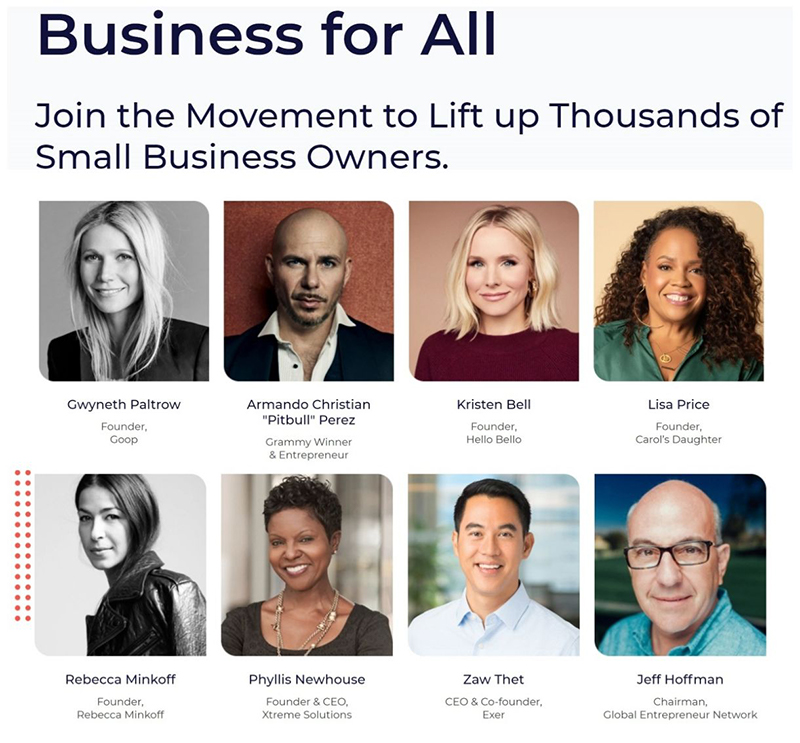
Jeff Hoffman and other famous entrepreneurs supporting small business owners.
Again, it’s a bad expectation to send a child into the real world where every time they ever asked an adult, they were told YES. That child is simply not prepared to handle the world as compared to the kid who can not only deal with rejection but can shake it off as he understands that it’s not fatal.
Luc Chénier: Moving on with that line of the topic. Can you give us a few tips that every father should be teaching his children on finance/money/life so they may have a better chance at succeeding in life?
JH: This subject is NOT well taught at home as well as in schools. I speak often at schools about curriculum and I do see that the ones that teach what they call ‘Financial Management’ is nothing more than balancing a checkbook! These days with all the technology, this is now automatically done with Apps. No one really does this by hand anymore. But even so, they teach you about the assets and liability, and it’s so basic, but it misses the most important thing which is the VALUE OF MONEY and the TIME VALUE of MONEY.
Everybody’s time has some sort of value attached to it as well as everything and assets have some form of value to it. For example: “Will you take me to the mall?” and you say: “Sure, for 5 bucks I will.” They stare at you in disbelief! You need to explain to them that you are asking me for the use of my time, my vehicle & gas which I will get nothing out of it. They will wonder why you should get something out of it. You need to explain that you are sitting comfortably watching a great football game. Why should I inconvenience myself to go to the mall? I don’t want to go there, you do! This was actually a real conversation I had with my daughter btw. She suddenly stopped and started to think over what had just happened. I told her that when you ask other people for something or from them to do something for you, you are basically asking them for something that has value for you but offering nothing in return.
That opened the conversation of why money was created for. There was no money at one point in time and people needed some sort of score system of what can you do for me and what can I do for you and we need some sort of little chips or markers. I was actually telling her the original story of the people who would do all the work explained very well in a book called 'Science since Babylon'.

The next time she came in, she said: “If I agree to wash your car on Sunday afternoon, will you take me to the mall?” I told her that this seemed like a respectful and fair offer – although I never really made her do it.
Teaching the value of money is what they need to learn. Not just the arithmetic of money.
Luc Chénier: Do you feel that MOM.CEOs have it harder than DAD.CEOs at balancing work/life duties? And with the Pandemic self-isolation, do you feel that while DADs have become more openly involved with their kids, they are getting a little too much credit for essentially doing things that MOMs have been doing forever?
Jeff Hoffman: Yes. And not only do I think that but think about this societally. This is just real whether people like it or not, a father that is at the office all the time and works like crazy is respected as a driven and ambitious executive. If a mom did that, she would simply be labeled as a horrible mother who doesn’t care about her kids. We’ve all heard this many times where the female CEO, clearly chose her career over her kids. But if it’s a man, the mom is expected to take care of the kids. This is the societal norm we inherited, not where we are today.
Women are already starting from behind and it’s not fair and it’s not a level playing field yet, and somehow, we need to get there. Therefore, breaking that societal norm is crucial!
A good example of breaking that societal norm is a friend of mine who was a very successful lawyer as was his wife who also happened to be a great attorney. Then they had 2 kids and one day they had a conversation about themselves from the 2 sides. The first side was who between them was good at being a parent, and who loves being home all day with the kids and doing school stuff? On the other side, who’s the better lawyer and who’s career is getting better and can support us better? They made a matrix!
He called me one day and informed me that he was quitting his practice and decided to be the stay-at-home parent. He and his wife decided that they wanted one of them to stay at home and fortunately, they could afford a life that one of them didn't need to work. He told me how they did this matrix and both of them agreed that he would be the best choice as the stay-at-home parent and she would be better off at the office every day. So, they decided to switch and I have to say that they are one of the happiest and most well-adjusted families that I know.
They didn’t listen to that societal crap! They decided as a family unit to chart their skills, desires, and everything else, and let’s do what is truly best for our family! When people try to give him a hard time for his decision, he simply lets them know that he is not there to make them happy, but his mission is to create what’s best for his family and that is exactly what he is doing. As he says with pride:
“I traded in my law practice for my parent practice, and that’s the one that has the true long-term value.”
Luc Chénier: What would be your top tips for being a successful DAD.CEO?
Jeff Hoffman: The first one obviously is communication. What I’m about to say is something that is extremely important for myself and that I learned the hard way. As people, we always underestimate the ability of children to understand. Things that we think are too complicated for them like “Oh, you’re a child, don’t worry about it, this is adult stuff”. We are wrong! They are constantly absorbing and overhearing everything and understand way more than you thought they could even if they didn’t say a word. So, we don’t give our children enough credit to comprehend what is truly going on. If you sat down and said:
“Here are the decisions we are about to make as a family and here is why”
Including your child as an equal vote at a family meeting, you would get a completely different result as opposed to saying: “We are the parents and we will tell you what we are doing". In the end, as a parent, it’s still ultimately your decision to make the final call, and you can always veto it, but including children at the decision table is super important.
The second one is something we talked about before, which is the quality of time. When you are present, then be truly present. And if you can’t give them quality, then make sure that your quality is simply above par. And then, keeping a sort of ‘scorecard’ is actually asking. Just because you are the parent, does not mean that you know better or right all the time.
“Because I’m your Parent and I know better”
This line has been used since the dawn of time. But guess what, it’s actually ok to ask them as well. It’s ok to ask them if you are doing a good job as a parent by asking them what you do that they like and dislike? But most parents don’t want to hear the answer to that, so they won’t ask. But, remember, you’re still the parent and you will ultimately make the decisions that need to be made. Think about it, it’s so much easier to accept a decision if you felt like you were properly heard in the first place. When your children feel like they didn’t even get a chance to even speak and you refused to hear them out, then they are automatically predisposed to be against whatever you are saying, not because they disagree with you, but because they feel unheard.
In conclusion, give them some respect upfront and a seat at the table and actually really listen. You will still make the decision, but it will be a totally different process if they are involved and their opinion is present where they can say: "Well, at least I was heard.”
This will come back later when you start digging deeper, as kids always say that their parents simply don’t listen to them yet they are supposed to listen to everything you say as a parent. Make them a part of the process and see how the dynamics change.
Luc Chénier: Being a CEO, you are encouraged in the workplace to listen to your employees, have more honest conversations with them, and listen to feedback, ideas, etc. in order for the company to grow and prosper. The same goes for listening to your customers and implementing their feedback into your business planning and approach. Yet at home, those same CEOs use the “I’m the parent and I know better” line, thus cutting off the lines of communications within their own family and limiting their own growth with the people closest to them.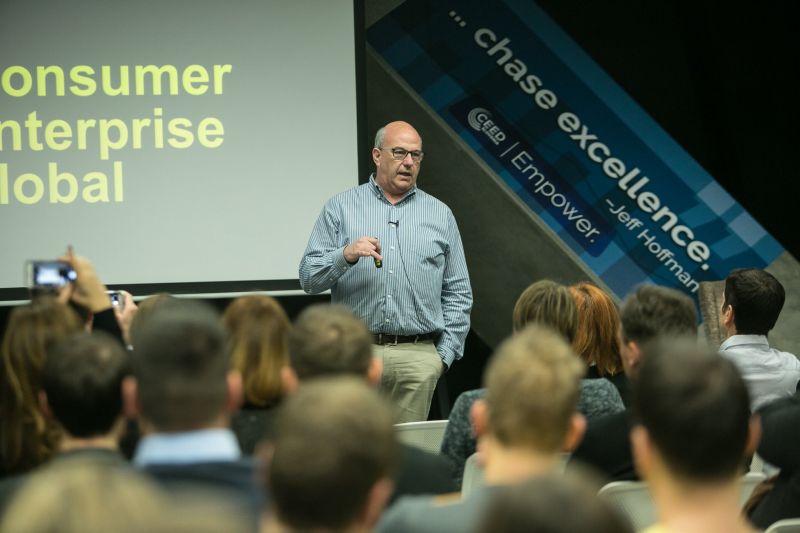
Jeff Hoffman giving a masterclass on entrepreneurship.
Jeff Hoffman: I agree. This is definitely a style thing where I was always a consensus type management style of a leader where I would tell my employees that I will make the final decision, but what I am asking for you in exchange for really listening to you, that when I do make a decision, I ask that you accept it and let’s all move on understanding that this was the decision that was to be implemented as a team.
The same goes with family and kids, once we have all been heard, the final decision is in your hands as a parent and we can’t go back and we must do our very best moving forward as a family.
Luc Chénier: Any last words of wisdom that you feel is important for dad’s out there to think about and implement?
Jeff Hoffman: I believe that the ‘Take Your Kid to Work Day' is a brilliant idea, but you should be doing it on your own more often.
Luc Chénier:
"But hasn't 2020 unofficially been Take Your Kids to Work every day?!"
Jeff Hoffman: (laughs) That’s a good one! They are there now more than usual and listening, and guess what? Let them! A good example of that would be in the early days when launching Priceline. My daughter wanted to know what we were launching, so I brought her to the office with me for an entire day and basically sat in on meetings, listened, and asked a lot of questions. You can do this right now. If your child wanted to sit in on a Zoom meeting quietly out of camera range, why not invite them? Allowing your child to come to your work and listen to what you do really changes things a lot because suddenly they start to understand better what you do by asking you questions and ultimately, they begin to feel like they are somehow a part of it and not the ‘sacrificial lamb’. Most of the time they feel like the ones that are being sacrificed for meetings. But if you invite them to sit quietly and listen in on what you are doing and then answer their questions – they will feel much more a part of what you do and how they fit in the entire dynamic of it all.
Luc Chénier: Jeff, I want to thank you for agreeing to meet with me, for your wisdom, your openness, and your honesty. I truly look forward to speaking to you again in the near future.
Jeff Hoffman: Ok, my friend. Do keep in touch and next time you are outside in the beautiful city of Kyiv, Ukraine, please do send me a few pictures as I haven't been there for some time.
Luc Chénier: That’s a deal Jeff!
NOTE: As promised to Jeff, an incredible shot of beautiful Kyiv, Ukraine
Kyiv's iconic 18th century St. Andrew's Church overlooking the historic district of Podil in Kyiv, Ukraine Photo: Evgeniy Bilan
ABOUT JEFF HOFFMAN
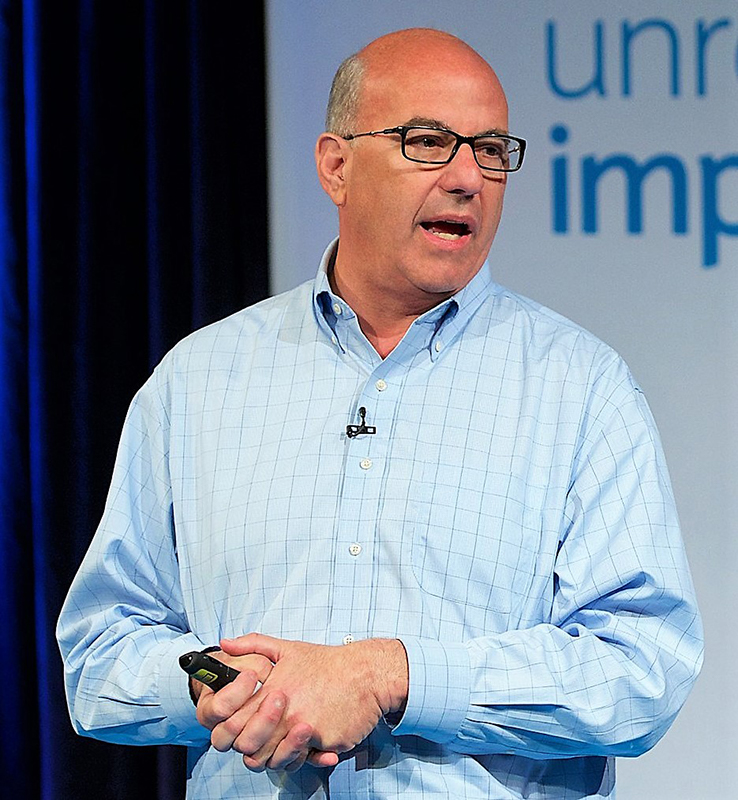
Jeff Hoffman is a successful entrepreneur, proven CEO, worldwide motivational speaker, bestselling author, Hollywood film producer, a producer of a Grammy-winning jazz album, and executive producer of an Emmy Award-winning television show. In his career, he has been the founder of multiple startups, he has been the CEO of both public and private companies, and he has served as a senior executive in many capacities. Jeff has been part of a number of well-known successful startups, including Priceline.com/Booking.com, uBid.com and more.
Jeff serves on the boards of companies in the US, Europe, the Middle East, South America, Africa, and Asia. He supports entrepreneurs and small businesses on a worldwide basis. He is the Chairman of the Global Entrepreneurship Network, which works with entrepreneurs in 180 countries, as well as being a founding board member of The Unreasonable Group. He supports the White House, the State Department, the United Nations, and similar organizations internationally on economic growth initiatives and entrepreneurship programs.
Jeff is a frequent keynote speaker, having been invited to speak in over 60 countries. He speaks on the topics of innovation, entrepreneurship, and business leadership, and is the author of the book SCALE, a how-to guide for growing your business. Jeff also teaches innovation workshops to major corporations on a regular basis.
Jeff was honored with the Champion of Entrepreneurship Award from JP Morgan Chase and Citibank, as well as receiving a Lifetime Achievement Award and being inducted into the Entrepreneurs Hall of Fame.
Outside of the world of technology, Jeff has produced TV shows, has produced movies in Hollywood, has produced musical events including concerts, tours, and charity events with such artists as Elton John, Britney Spears, NSYNC, Boyz II Men, and others, and serves on numerous charity and non-profit boards.

